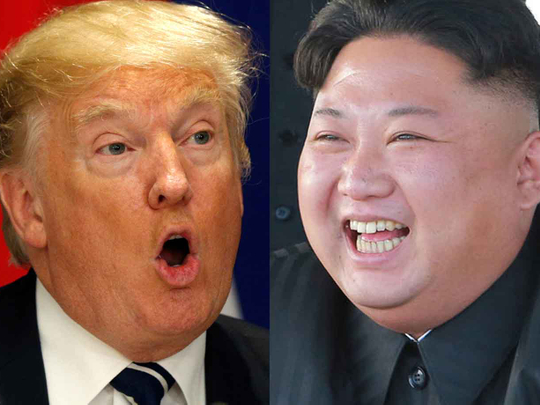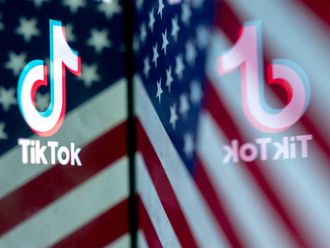
North Korean leader Kim Jong Un has confused a lot of English-speakers —though this time not about what he intends with his nuclear programme.
Responding to US President Donald Trump's bellicose warning to Pyongyang in his first speech to the UN on Tuesday, Kim on Friday called Trump a "dotard" — at least in a translation by the state news agency KCNA.
The obscure word is old — late Middle English, or around the 14th century — and means "senile old person, someone in their dotage".
Although Shakespeare and Tolkien used it, the word is barely heard these days and Kim's statement caused a Twitter storm of questions to Merriam-Webster dictionary about its meaning, while searches on Google also increased.
Merriam-Webster responded with a tweet, defining dotard as "a person in his or her dotage," which is "a state or period of senile decay marked by decline of mental poise and alertness," which quickly became the top trending post on Twitter on Friday, with more than 7,400 retweets and 13,000 likes.
READ MORE:
South Korea: US warning firm, specific
Gold up on North Korean tensions
How to escape North Korea
The Korean original statement said "늙다리 미치광이," which means old beast lunatic -- which was translated into "dotard." https://t.co/2uQ0Xsxe2X
— Jihye Lee 이지혜 (@TheJihyeLee) September 21, 2017
There were more than 100,000 mentions of the hashtag #dotard and 189,000 mentions of the word on Twitter on Friday, according to international social media analytics firm Talkwalker.
📈 Kim Jong Un calls Trump a mentally deranged U.S. dotard. Searches for 'dotard' are high as a kite. https://t.co/HztPoLSjXi
— Merriam-Webster (@MerriamWebster) September 21, 2017
On Google's Ngram Viewer, which tracks the popularity of words over time, "dotard" was a word that peaked in the 18th century.
Many social media users also took to Twitter to deliver their best jokes.
📈 The word meant "imbecile" when it was first used in the 14th century. https://t.co/jqrHao0R9i
— Merriam-Webster (@MerriamWebster) September 21, 2017
"By making people look up the word #dotard, Kim Jong Un has done more for American education than Betsy DeVos," wrote one user, @TurmUp_TheTweet. DeVos is the US Secretary of Education.
Other Twitter influencers did not find the insult amusing.
"This hashtag is a disgrace: #DotardTrump," tweeted LoConservative founder Kassy Dillon. "Whether you like him or not, Trump is your president & Kim Jong Un is a dictator & a murderer."
And novelist Elnathan John said: "Am I the only one who doesn't find this Trump-Jong Un war dance funny? Why are we all giggling at these two men who CAN destroy us? #dotard."
Taunts
North Korean dictator Kim Jong Un, the target of that verbal missile launch, shot back a flurry of taunts, calling America's leader "a rogue," "a frightened dog," a "gangster fond of playing with fire."
But it was one word — dotard — that lit up social media, sent countless masses thumbing through dictionaries (or the online equivalent), one word that turned the back-and-forth between the brinksmen into a teachable moment.
"Now that Trump has denied the existence of and insulted me and my country in front of the eyes of the world and made the most ferocious declaration of a war in history ... we will consider with seriousness exercising of a corresponding, highest level of hard-line countermeasure in history," Kim said Thursday in a rare first-person response to Trump's belligerent remarks this week at the United Nations.
"Action," Kim went on, "is the best option in treating the dotard who, hard of hearing, is uttering only what he wants to say."
Prounciation
The pronunciation is DOE-terd.
Dotard, as many were soon to learn per Merriam-Webster, means "a person in his or her dotage," which is "a state or period of senile decay marked by decline of mental poise and alertness."
It was fashionable centuries ago, turning up in literary greats such as Chaucer -- "olde dotard shrewe" -- and Shakespeare -- "I speak not like a dotard nor a fool." The word, rooted in Middle English, immediately gained new currency, lofted by Kim's ballistic rejoinder.
Puzzlement quickly gave way to partisanship, as Trump foes delightedly seized on the insult.
Which, naturally, resulted in a flurry of Trump supporters returning fire.
The president, inevitably, weighed in Friday morning with a tweet of his own.
All of which briefly diverted from the existential threat of a series of schoolyard insults escalating into a nuclear war and holocaust that could obliterate much of mankind.












